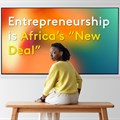Olufemi has spent the bulk of his adult life immersed in an environment where the only agenda was creating a better future for the continent. He sits on Kantar’s emerging leaders board in Nigeria and is by background and ambition part of the next generation of leaders who will transform Africa. He says, “If you’ve been to Africa, you know markets are the very heart. That’s where life happens. There’s lots of movement, rhythm, trading, sales and advertising.”
It’s an apt introduction because while the informal sector comprises mainly micro and small businesses, as many of 93% of people in Nigeria and 85% of people in Africa overall are employed in the informal sector. It’s easy to see why it comprises the bulk of the economy, sitting beside the final consumers on the supply chain.
MediaNdeye Diagne, Kantar 14 Jan 2022
Think about it: they rely on the informal sector for everyday goods like toothpaste, cooldrinks and other soft supplies. It also holds vast opportunities for growth in the tech-driven world as home to one of the most advanced tech payment systems. M-Pesa showed the way in harnessing the massive mobile penetration in Africa.
Fintech advancements are being further driven by banks as they introduce innovative ways of making transactions seamless through USSD codes, internet banking and banking apps. All of this is now accessible from everyone’s favourite accessory - the smartphone.
Everyone, really everyone, can now receive instant money transfers directly to their savings accounts. Similarly, businesses in the informal sector can now access credit and carry out transactions without having to see the inside of a bank.
It’s time to tell a different story about Africa – ultimately, the informal sector, now powered by tech, holds great prospects for people in Africa and industry giants alike. Spurred on by technology, it’s a field of growth, presenting opportunities to build a vast and vibrant ecosystem of small and medium businesses and ‘hustle-preneurs’ alike.
They’re setting up businesses using only social media as their marketing platforms and fintech companies as their financial and business management providers. They can make business happen simply by posting about their product or service on a social media page.
MediaNdeye Diagne, Kantar 12 Jan 2022
Industry giants can further take advantage of the informal sector’s proximity to the end consumers on the distribution chain. Influence product usage in the same way FMCGs run marketing campaigns by offering small shops and kiosks signage to enhance visibility through brand name and presence.
It’s an opportunity for brands to identify and build disruptive local partnerships, which will allow them to deliver faster, better and in more memorable ways to consumers. Let’s help rewrite the story of Africa’s informal sector as the future of Africa and an entrepreneurship hub.
Watch out for our follow-up deep-dives into some of the high-potential intersections that these changing dynamics are creating for people and businesses in Africa. We’ll explore the need to think differently and spark unconventional ideas and look into the exciting new opportunities around culture, tech, social, and social commerce; we’ll continue to cover the craze around entrepreneurship and reveal how Africa’s single biggest opportunity is its human and creative capital.
Find out all about Africa Life here. with a focus on understanding the youth and the women of Africa. Missed the live launch? Register to watch the hour-long brand learning session on demand.
ResearchNdeye Diagne, Kantar 16 Sep 2021
